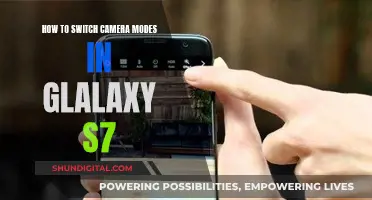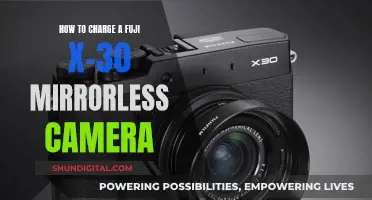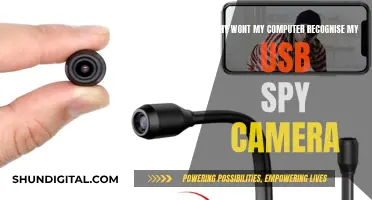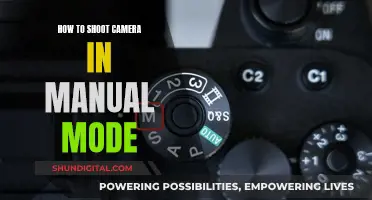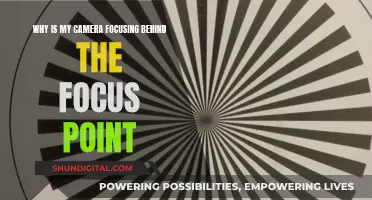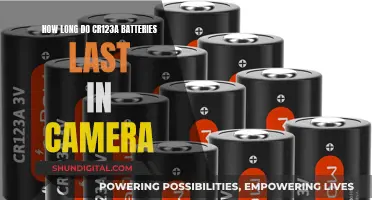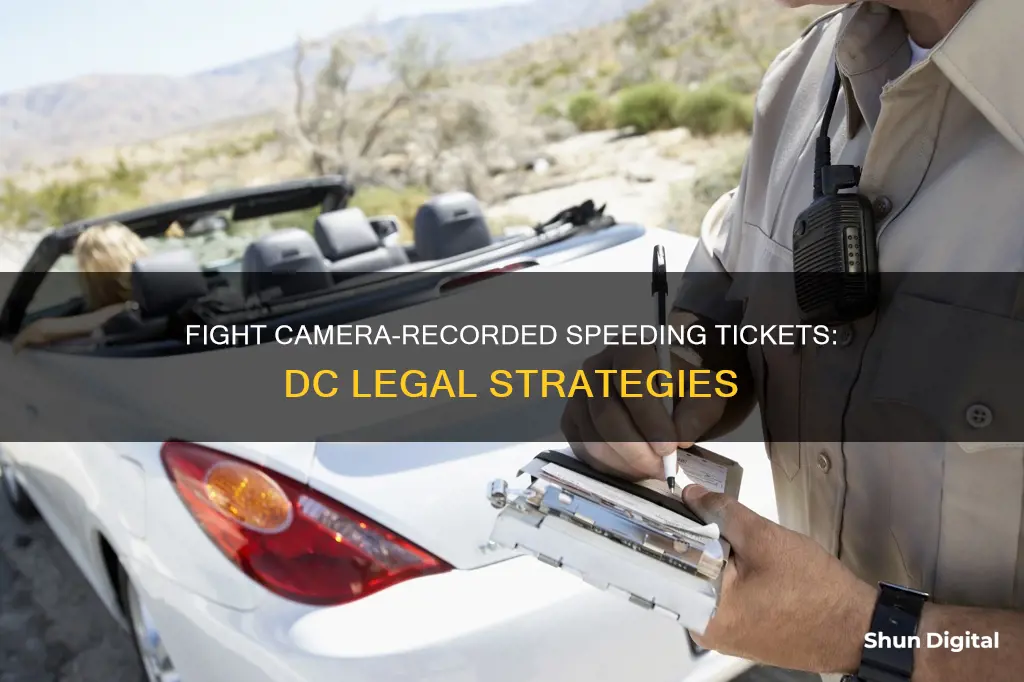
If you've received a speeding ticket in DC, you may be wondering if it's possible to beat it. The good news is that it is possible to successfully dispute a speeding ticket, especially if there are discrepancies in the evidence or issues with the placement and visibility of speed limit signs. Here's a step-by-step guide on how to beat a camera speeding ticket in DC.
What You'll Learn

Plead not guilty and request a DMV hearing
If you want to plead not guilty to a camera speeding ticket in DC and request a DMV hearing, there are a few steps you need to take. Firstly, it's important to note that you must not pay the fine or penalty associated with the ticket. Once you have paid, you waive your right to contest the ticket. The next step is to decide whether you want to contest the ticket virtually, by mail, or in person.
If you choose to contest the ticket virtually or by mail, you will need to submit a statement or defence, along with any evidence, to the DMV hearing examiner for consideration. The hearing examiner will review the information and make a decision regarding the fine or penalty. If you are not satisfied with the decision, you have the right to submit a Motion for Reconsideration within 30 days.
When contesting a ticket by mail, you must ensure that the DMV receives your request within 30 calendar days. You will receive a postcard confirmation of their receipt of your request. If you do not receive this postcard, you can contact the DMV or call DC 311 to confirm.
If you choose to contest the ticket in person, you must visit the Adjudication Service Center for a walk-in hearing. To contest the ticket, you must be the registered owner of the vehicle and present the vehicle registration. Alternatively, the owner can authorise someone else to act on their behalf by completing and signing a power of attorney form. If the ticket was issued to a rental car, you must provide the rental agreement for the vehicle, showing that the rental period matches the date the ticket was issued.
How to Find the Crop Tool in Camera Raw?
You may want to see also

Prove your innocence with a police report
If you want to prove your innocence after receiving a speeding ticket from a speed camera in Washington, DC, you must first contest the ticket and request an administrative hearing at the DMV. It is important to note that you should not pay the fine associated with the ticket, as you cannot contest a ticket once the fine has been paid.
To initiate the process of contesting the ticket, you must submit a request for an administrative hearing. This can be done online, by mail, or in person at the Adjudication Service Center. During the hearing, you will have the opportunity to present your defence and any evidence that supports your claim of innocence.
Now, here is where the police report comes in. Before the hearing, you must file a police report with the Metropolitan Police Department. This report should detail the circumstances surrounding the speeding ticket and any evidence you have that proves your innocence. For example, if your vehicle or license plate was stolen at the time the license plate was photographed by the speed camera, be sure to include that information in the report.
At the hearing, you must appear with a copy of the police report. This report will serve as evidence to support your claim of innocence. It is recommended that you seek the assistance of an attorney who can appear on your behalf at the hearing and help challenge the photograph or mitigate the circumstances. The hearing examiner will consider all the information presented and make a decision, which could result in the dismissal of the speeding ticket.
Traffic Camera Tickets: Out-of-State License Impact?
You may want to see also

Argue the camera malfunctioned
If you want to argue that the camera malfunctioned and thus dispute a traffic camera ticket, there are a few steps you can take. Firstly, examine your ticket. Check the date, time, and location, and confirm that you were indeed the one driving the car when the ticket was issued. If someone else borrowed your car, you cannot be prosecuted.
Next, review the photos that came with the ticket. If the photos are blurry and your license plate isn't clearly visible, this can be a strong argument in your defence. Additionally, if there is no clearly identifiable photo of you in the driver's seat, the prosecution may not be able to prove that you were driving.
After reviewing the evidence, you can plead not guilty by mail, online, or in person, depending on the jurisdiction. If you plead not guilty, you can request a full formal hearing or trial. During the hearing, you can challenge the authenticity and admissibility of the photographs as evidence. Argue that the prosecution cannot prove that the camera, the system connecting it to the traffic light, and the traffic light itself were functioning properly. Without establishing this foundation, the photo may not be reliable enough to be admitted as evidence.
Furthermore, you can request the production of documents related to the camera's maintenance and calibration. Ask for full maintenance records and calibration checks to establish that the camera was regularly monitored and maintained. If the accuracy of the camera was not tested shortly before your ticket was issued, it may cast doubt on the reliability of the photo evidence.
Lastly, research applicable laws and cases in your city or county regarding traffic cameras. Look for any recognised defences, such as specific rules about warning signs for cameras or a necessity defence for speeding.
Uniview Cameras: Where Are They Manufactured?
You may want to see also

Challenge the admissibility of the photo as hearsay
Hearsay evidence is any statement made outside of the courtroom that is presented as evidence by someone other than the individual who originally made the statement. In the context of a speeding ticket, a red light camera photo is considered hearsay. This is because the photo is an out-of-court "statement" that the prosecution is attempting to use to prove you violated the traffic law.
Hearsay evidence is generally inadmissible in court, as the person who made the statement is not present to verify it or be cross-examined on its accuracy. However, there are exceptions to the hearsay rule, and some courts have allowed traffic camera photos to be admitted under these exceptions.
If you are contesting a speeding ticket in DC, you can challenge the admissibility of the photo as hearsay. Here are some steps you can take:
- Research the law and previous cases: Look for cases in your city or county regarding traffic cameras, and see if any appellate court decisions have ruled on the legality of traffic camera photos as evidence. Understanding the legal landscape can help you build a strong argument.
- Review the photos: If possible, obtain clear and identifiable photos of the incident. These photos may be included with your citation or you may need to request them from law enforcement.
- Identify potential issues: Analyze the photos for any signs of unreliability or lack of foundation. For example, if the license plate is not clearly visible, it may be difficult to confirm that the car is yours.
- Object to the evidence: At your hearing, present your argument to the judge, challenging the admissibility of the photo as hearsay. Highlight any issues you have identified and argue that the prosecution cannot prove you were driving the car or that the camera equipment was functioning properly.
- Seek legal advice: Consult with a licensed attorney who can guide you through the process and help you build a strong case. An attorney may appear on your behalf at a DMV administrative hearing and provide information to challenge the photograph or mitigate the circumstances.
The Contax G2 Camera: A History of its Evolution
You may want to see also

Argue the prosecution can't prove you were driving
If you want to argue that the prosecution can't prove you were driving, you can use what is known as the "no-driving defense". This is a common legal challenge to driving charges, including DUI cases. The "no-driving defense" can be used when no one, including the police, actually witnessed you driving a motor vehicle. This often happens when there has been an accident or the car breaks down, and law enforcement officers typically arrive on the scene after the driving has stopped.
To convict you of a driving offense, the prosecutor must prove beyond a reasonable doubt that you were driving. Proof can be made by either direct or circumstantial evidence. Direct evidence of driving might include testimony by an arresting officer or a witness who saw you drive, traffic camera photographs of you behind the wheel, or your own statements admitting that you were driving.
However, sometimes there is no direct evidence, and the prosecutor must rely on circumstantial evidence. In this case, the prosecutor will argue that the vehicle could not have gotten to where it was unless someone drove it there. For example, if a car is found parked in the middle of a street, the prosecutor may argue that someone must have driven it there.
Even if there is no direct evidence of driving, there may be sufficient proof of "operational control" to convict you. Operational control is typically defined as being found behind the wheel with the keys in the ignition. Even if the car engine isn't running, this can still be considered sufficient proof of driving under the law.
If you want to contest a speeding ticket in DC, you must be the registered owner of the vehicle and either pay the fine or request a DMV administrative hearing to contest the ticket. An attorney may be able to help you contest the ticket and can appear on your behalf at the hearing. They may provide information that challenges the photograph taken by the speed camera or mitigates the circumstances, potentially resulting in the dismissal of the ticket.
Spy Camera Battery Life: How Long Does It Last?
You may want to see also
Frequently asked questions
If you want to contest a speeding ticket in DC, do not pay the fine. You can contest a ticket virtually, online, by mail, or in person. You must be the registered owner of the vehicle or have the owner authorize someone to act on their behalf. You will need to submit a statement, your defence, and any evidence for the defence that you want the hearing examiner to consider.
Some defences for speeding tickets in DC include:
- Proving that you were not driving the vehicle at the time of the offence.
- Disputing the accuracy of the speed camera by citing articles about camera malfunctions.
- Arguing that the speed limit sign was obscured or not clearly visible.
- Arguing that the prosecution cannot prove you were speeding if there is no clearly identifiable photo of you in the driver's seat.
The speeding ticket process in DC involves receiving a notice of infraction by mail, which includes a photograph of the vehicle and its license plate. The owner of the vehicle must then either pay the fine or request a DMV administrative hearing to contest the ticket. If the hearing examiner's decision is unsatisfactory, a Motion for Reconsideration can be submitted within 30 days.


